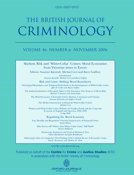-
Views
-
Cite
Cite
Michael Levi, The Media Construction of Financial White-Collar Crimes, The British Journal of Criminology, Volume 46, Issue 6, November 2006, Pages 1037–1057, https://doi.org/10.1093/bjc/azl079
Close - Share Icon Share
Abstract
Crimes of deception are treated by the mass media as extensions of ‘infotainment’, such as individual and corporate celebrities in trouble; ‘normal’ people turning to fraud because of drugs, gambling or sex; readily visualizable and often short fraud events (like ‘identity fraud’ or ‘card skimming’) connected to ‘organized crime’ or ‘terrorism’; or long-term concealment of fraud that shows the ‘Establishment’ to be incompetent or business people/politicians to be hypocrites. These populist themes, prosecutions and regulatory actions, active non-governmental organizations (NGOs) and lobbyists, media technology and libel risks influence what business activities get labelled as ‘fraud’ or ‘corruption’. However, the growing specialist business and technology press and electronic media report worldwide less sensational cases involving reputational damage, business prospects and technological vulnerability, and these affect business people (if not the general public) in ways that may be neglected by traditional media and crime studies.




